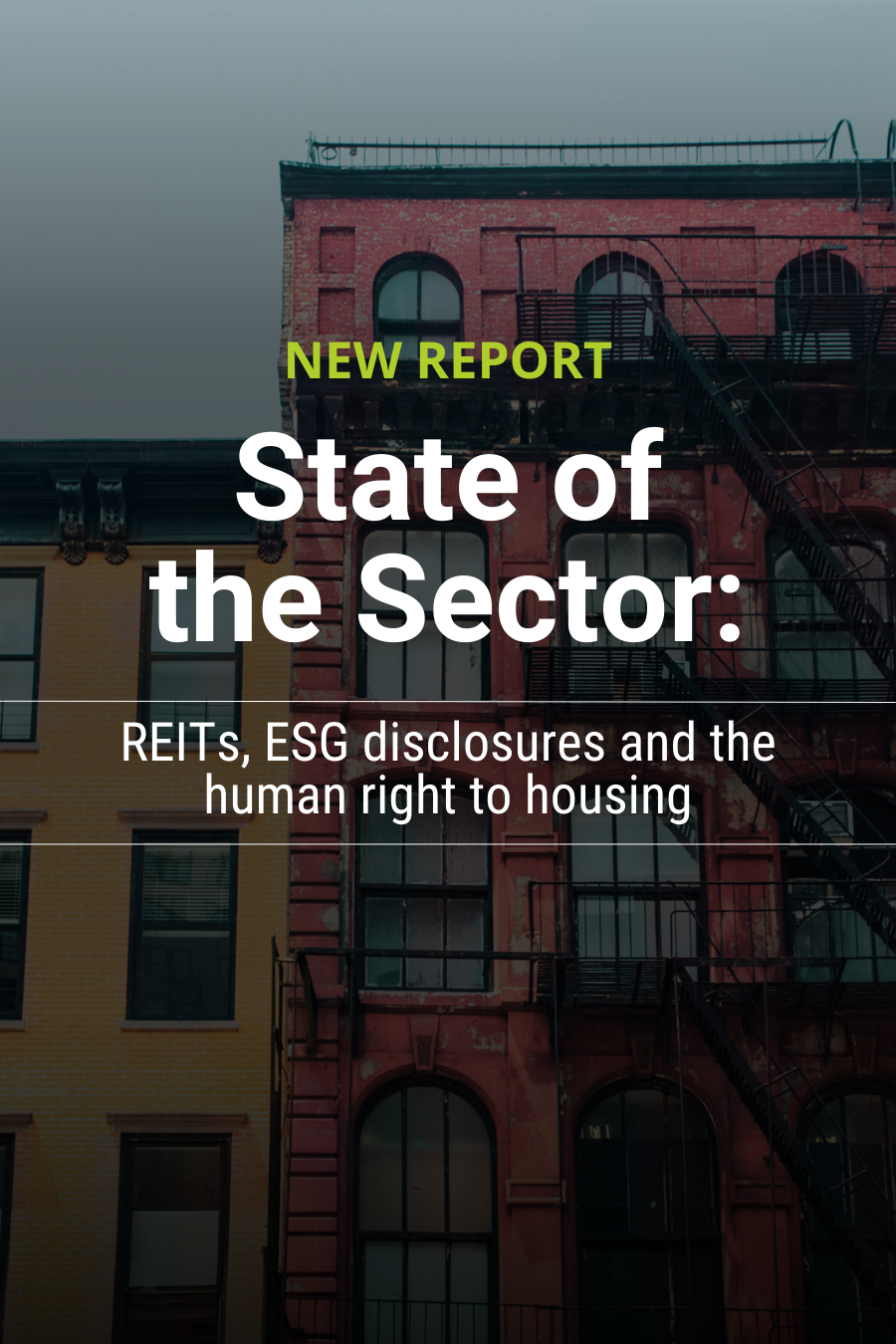Updated Aug. 1, 2023
Investing in the housing sector raises a distinct set of human rights risks for investors.
Real Estate Investment Trusts (REITs) have come under scrutiny in the media for adverse impacts on the human right to adequate housing, such as neglecting building maintenance, driving up rents and high rates of evictions. These practices can contribute to reputational and regulatory risks for investors.
The growing presence of institutional investors in the Canadian rental real estate market is a phenomenon often called the financialization of housing. Through their public equities portfolios, a wide range of investors are exposed to REITs in the residential sector.
Investors have human rights obligations, however, there are few tools to guide investors in understanding if and how their residential REITs investments uphold the human right to adequate housing and effectively address the associated risks.
Our latest report, State of the Sector, proposes a set of recommended ESG disclosures for REITs. If adopted, REITs could provide the data that would allow investors to identify, manage, prevent and/or mitigate adverse impacts related to the human right to adequate housing in their residential portfolios. Across sectors, reporting and transparency allow for more robust accountability and more effective mitigation of portfolio risks.
Institutional investors expect publicly listed companies to disclose enough information on investment risks, including human rights risks, to enable them to adequately consider environmental, social and governance (ESG) factors and conduct human rights due diligence.
With next to no information in their reports on eviction rates and approaches to building maintenance, the report concludes that REITs do not disclose enough data to enable investors to assess how well they are upholding the right to adequate housing.
READ NOW
State of the Sector
Our latest report proposes a set of recommended ESG disclosures for REITs. If adopted, REITs could provide the data that would allow investors to identify, manage, prevent and/or mitigate adverse impacts related to the human right to adequate housing in their residential portfolios. These recommended disclosures would allow investors to understand how REITs approach housing affordability, security of tenure and evictions, and building habitability in their portfolios.

In State of the Sector, we identify key metrics such as how rents compare to renter incomes in a given market, how much rents increase when suites are rented to new tenants, how much more newly renovated suites rent at, as well as eviction rates and how REITs use above-guideline rent increases to perform building maintenance.
The report reviews the public filings of Canada’s six largest residential REITs in 2021 and 2022: Boardwalk, CAPREIT, InterRent, Killam, Minto, and Morguard. We look at whether the information REITs disclose in their public filings tells investors what they need to know about human rights risks in their portfolios and gauge – where sufficient data permits – their performance.
The report also finds that investment strategies that capitalize on tenant turnover and suite renovations to increase rents are a detriment to affordability and can have a negative impact on human rights.
Based on the available data, our research estimates that CAPREIT’s average rent, for example, would consume 76% of a median wage-earning renter’s income in Toronto, leaving $514/month for other expenses.
We estimate that a tenant paying an average rent in one of Minto’s renovated suites would be paying $2,648/month, which would leave them with $564 for other expenses if they were earning a median renter income. Importantly, with next to no information in their reports on eviction rates and approaches to building maintenance, the report concludes that REITs do not disclose enough data to enable investors to assess how well they are upholding the right to adequate housing.
SHARE’s recommended disclosures are aligned with the three interrelated conditions that the UN Human Rights Office of the High Commissioner (UN OHCHR) defines as necessary for housing to be adequate and that the SHIFT Directives from Financialized to Rights-Based Housing identified as pertinent to institutional investment in housing – namely, affordability, security of tenure, and habitability. The disclosures are based on a set of principles and a progressive framework developed by SHARE for responsible investment in housing.
SHARE’s Investors for Affordable Cities initiative is generously supported by the British Columbia General Employees’ Union (BCGEU), the Catherine Donnelly Foundation, the Lucie and André Chagnon Foundation, the Ottawa Community Foundation, and the Vancouver Foundation. For more information about the project, please contact Tamara Herman at therman@share.ca


